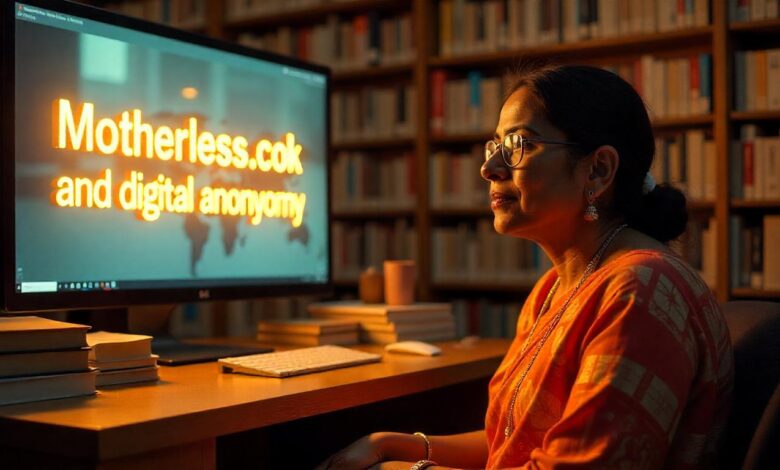Motherless.cok: Grief and Digital Anonymity

As the internet continues to evolve, so too do the ways in which we process and express our emotions, particularly grief. While the digital realm has made it easier than ever to share our pain and seek support, it has also given rise to controversial platforms like motherless.cok, where grief, trauma, and anonymity converge in unsettling ways. In this analytical opinion piece, we’ll explore how digital anonymity affects the mourning process, how niche platforms like motherless.cok both help and harm mental health, and whether these online spaces are conducive to healthy emotional expression or exploitation.
The Emergence of Digital Spaces for Mourning
Historically, grieving was a collective process—families and communities came together in physical spaces to mourn and offer comfort. However, in the digital age, much of this mourning has shifted to online spaces, where anonymity and distance allow for the free expression of sorrow, pain, and loss. The internet offers unique platforms for people to process grief, whether through social media, memorial pages, or niche forums.
The rise of niche platforms, including controversial spaces like motherless.cok, has added complexity to how grief is shared and understood online. While some platforms are designed with empathy in mind, others cater to individuals seeking an outlet for deeply personal or painful emotions. For many, sites like motherless.cok represent a place where grief can be expressed without judgment. Yet, for others, these spaces can feel exploitative and even harmful.
The Role of Anonymity in Grief Expression
Anonymity is one of the defining characteristics of the internet, and it has a profound impact on how people express grief. For some, the ability to remain anonymous online provides a sense of freedom that makes it easier to share raw emotions. In a world where expressing grief is often stigmatized or misunderstood, anonymity offers protection from the fear of judgment.
On platforms like motherless.cok, users can vent their frustrations, share intimate stories, and express sorrow without the social constraints of real-life interactions. This can be both liberating and dangerous. While anonymity allows for catharsis, it can also lead to the dissemination of harmful content, including explicit, graphic expressions of grief or trauma. The lack of moderation on certain platforms means that harmful material often slips through the cracks, potentially retraumatizing users who come to these spaces seeking comfort.
For those mourning a loss, anonymity might feel like a safeguard, but it also raises questions about the ethics of grieving in a public, unregulated space. Is it possible to grieve without exposing oneself to emotional danger?
Grief as Content: The Complicated Intersection of Trauma and Digital Platforms
In the world of digital content, everything is potentially consumable—grief included. Platforms like motherless.cok have blurred the lines between genuine emotional expression and content creation. While some users may feel that these spaces allow for the open expression of pain and trauma, others view them as exploiting grief for entertainment or shock value.
The commodification of grief online is a double-edged sword. On well-moderated platforms designed for grief support, users can share their emotions, seek advice, and find community in a safe environment. However, platforms like motherless.cok, which cater to darker forms of expression, allow for unfiltered content to be shared without regard for the emotional impact it may have on others. The result is a troubling intersection where grief is reduced to content, and emotional release becomes a form of spectacle.
Such platforms often attract those looking to process their trauma without guidance or structure, leading to an unregulated environment that can perpetuate harmful behavior. While some might argue that this free expression is empowering, it can often result in greater emotional harm, especially when grief is shared in inappropriate or disrespectful contexts.
Healthy vs. Harmful Grief Spaces: Where Does Motherless.cok Fit In?
In the digital age, there are vast differences between grief spaces that are designed to heal and those that may exacerbate emotional pain. Websites like Grieving.com and The Mighty provide moderated, safe environments where users can express their grief in a supportive, understanding context. These spaces offer a community where mourning is treated with respect, and users can find shared experiences or professional help.
In contrast, platforms like motherless.cok—though not originally designed as grief spaces—attract people seeking an outlet for their pain. While these platforms offer anonymity and a lack of regulation, they also encourage the sharing of graphic or unsettling content that may not be conducive to healing. The lack of moderation or clear guidelines can lead to situations where grief is mishandled, either by the individuals sharing their stories or by those consuming the content.
These contrasting approaches to grief highlight the complexities of online emotional expression. While some sites provide structured support, others allow for unchecked emotional outpouring, which can be both liberating and harmful.
The Ethics of Moderating Grief: Can We Protect Users Without Censoring Emotion?
Grief, by its very nature, is chaotic, intense, and unstructured. But in an online environment, where everything is processed as content, there is a tension between allowing raw emotional expression and ensuring that the space remains safe for all users. This is where moderation becomes crucial.
On a platform like motherless.cok, where emotional content can often overlap with graphic or inappropriate material, moderation is an ethical necessity. Moderators should be able to distinguish between healthy emotional expression and content that could be harmful to others, such as posts that glorify self-harm, suicidal thoughts, or trauma. However, the challenge lies in moderating grief without censoring genuine emotional expression.
Effective moderation involves providing safe outlets for grief, offering trigger warnings, and encouraging healthy discussions. Platforms that provide grief support—whether mainstream or niche—must be equipped to handle the complexity of human emotion. This includes not only moderating harmful content but also offering resources, such as counseling or crisis intervention, to those who may need professional help.
Should Controversial Platforms Like Motherless.cok Be Censored?
When controversial platforms like motherless.cok come under scrutiny, the question of censorship inevitably arises. Many argue that the presence of graphic or harmful content on such platforms makes them dangerous for users, especially those processing trauma or grief. However, the issue is not so simple. Censoring these platforms may drive users into even more obscure corners of the internet, where harmful content is even less regulated.
Rather than outright censorship, a more nuanced approach might involve creating healthier alternatives that draw people away from exploitative spaces. This could involve offering better-designed platforms that are both free from harmful content and supportive of grief expression. Censorship could silence important voices, leaving users without a place to share their pain. Instead, the focus should be on creating digital spaces that protect and nurture users, providing them with safe ways to express their grief.
The Future of Digital Grief: Navigating Online Spaces with Care
As digital culture continues to evolve, so too will the ways in which we process grief. The internet is likely to remain a major platform for emotional expression, whether through social media, personal blogs, or niche communities. But as we continue to explore the intersection of grief and digital anonymity, it is crucial to create spaces that not only allow for the expression of pain but also promote healing and understanding.
The rise of controversial platforms like motherless.cok serves as a stark reminder that while the internet can be a powerful tool for support, it also requires careful design and ethical consideration. We must find ways to ensure that grief expression online is constructive, not exploitative, and that vulnerable individuals have access to the resources they need.
FAQs
1. What is motherless.cok and how is it perceived?
Motherless.cok is a controversial website that originally catered to adult content but has also become a space where users share disturbing emotional content. It is often criticized for its lack of moderation and the potential harm it causes to those who come to the platform seeking an outlet for their grief.
2. Are there healthy online spaces for grief support?
Yes, platforms like Grieving.com, The Mighty, and various grief-focused subreddits offer moderated environments where users can share their grief in a safe and supportive context. These platforms often include mental health resources and peer support.
3. How can digital grief expression be moderated?
Digital grief expression can be moderated by implementing community guidelines, AI tools for detecting harmful content, trigger warnings, and professional oversight. The goal is not to censor grief but to ensure it is expressed in a safe and healthy environment.
4. Should controversial platforms like motherless.cok be censored?
While censorship may seem like a solution, it could drive users to even less regulated spaces. A better approach would be to promote healthier alternatives and create environments that support safe, responsible grief expression.



